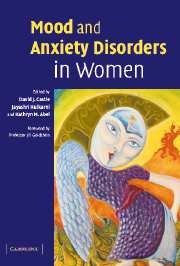Book contents
- Frontmatter
- Contents
- Contributors
- Preface
- Foreword
- 1 Pubertal development and the emergence of the gender gap in mood disorders: A developmental and evolutionary synthesis
- 2 Borderline personality disorder: Sex differences
- 3 Substance use and abuse in women
- 4 Anxiety disorders in women
- 5 Posttraumatic stress disorder in women
- 6 Domestic violence and its impact on mood disorder in women: Implications for mental health workers
- 7 Depression in women: Hormonal influences
- 8 Anxiety and mood disorders in pregnancy and the postpartum period
- 9 Pharmacological treatment of anxiety and depression in pregnancy and lactation
- 10 Bipolar affective disorder: Special issues for women
- 11 Mood and menopause
- 12 Anxiety and depression in women in old age
- Index
7 - Depression in women: Hormonal influences
Published online by Cambridge University Press: 13 August 2009
- Frontmatter
- Contents
- Contributors
- Preface
- Foreword
- 1 Pubertal development and the emergence of the gender gap in mood disorders: A developmental and evolutionary synthesis
- 2 Borderline personality disorder: Sex differences
- 3 Substance use and abuse in women
- 4 Anxiety disorders in women
- 5 Posttraumatic stress disorder in women
- 6 Domestic violence and its impact on mood disorder in women: Implications for mental health workers
- 7 Depression in women: Hormonal influences
- 8 Anxiety and mood disorders in pregnancy and the postpartum period
- 9 Pharmacological treatment of anxiety and depression in pregnancy and lactation
- 10 Bipolar affective disorder: Special issues for women
- 11 Mood and menopause
- 12 Anxiety and depression in women in old age
- Index
Summary
By 2020, the World Health Organisation (WHO, 1997) has predicted that depression will be the “second leading cause of global disability burden” and that as many as one in four women will suffer from a mood disorder during their lifetime.
Women have an increased vulnerability to depressive disorders during their child-bearing years. During this time, they are also more likely to experience sexual and domestic violence, social and financial inequities, and often to undertake many different roles with attendant responsibilities. The child-bearing years are associated with specific hormonal changes related to menstrual cycle variations, contraception, pregnancy and the postpartum period and the menopause. Increasingly there are also the iatrogenic hormonal manipulations associated with contraception and assisted reproductive technologies.
Clearly, these sex-specific factors deserve special consideration in the understanding and management of depression in women. The reader is also referred to Chapter 1 for an overview of depression in adolescence, Chapter 9 for a more detailed discussion of mood disorders in pregnancy and postpartum and Chapter 11 for a review of mood in the menopausal period.
Epidemiology
Worldwide, major depression is at least twice as common in women as men (Weissman et al., 1993), accounting for 41.9% of the disability from neuropsychiatric disorders among women compared to 29.3% among men; these data appear consistent with current UK figures (Office for National Statistics (ONS), 2001).
Keywords
- Type
- Chapter
- Information
- Mood and Anxiety Disorders in Women , pp. 116 - 135Publisher: Cambridge University PressPrint publication year: 2006

